
By E.A. Barrera
March 5, 2018 (San Diego) -- My mother, Marion Kathryn Holmes Barrera, died on March 3, 2018. She died a little after four in the morning, 25 days to the minute from when my father died. My dad was San Diego State Professor Ernesto Martin Barrera. Together, my parents led a life that began on the campus of UCLA and took them to Cartagena, Los Angeles, San Diego - and a lifetime of romance, family and meaningful purpose.
My mom was born on October 20, 1938 in Queens, New York, at the tail end of the Great Depression and right before World War Two. FDR was president and Bing Crosby’s voice serenaded from every radio. She was a 1940’s and ‘50’s Brooklyn girl - a poor, working-class Catholic daughter of Albert Holmes - a Norwegian-Swedish immigrant; and Marion Yander Holmes - a German-Irish Democrat. Her big sister Marjorie was also like a parent to my mom – she took her to Dodger games and movies and talked to her about life. As far as my mom was concerned, Marjorie was her north-star throughout her life.
From Jackie Robinson and the Dodgers, to Jamaica High School in Queens, to listening to Xavier Cugat records with her friends at parties on Highland Avenue, she never lost her love for New York. Though she spent the bulk of her life in San Diego, if you asked her where she was from, she’d always answer with one word … Brooklyn.
Mom came of age in a post-war America that had no limits or equal and she was part of that first generation of rock-roll kids that screamed for Elvis Pressley, and listened to Fat’s Domino and Chuck Berry records behind their parents’ backs. That thought Marlon Brando was the greatest actor alive, and Adlai Stevenson the soul of America’s moral conscience.
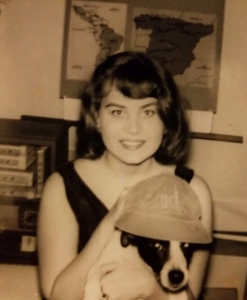 She suffered through Bobby Thompson’s 1951 “shot heard ‘round the world” home run, which kept her Dodgers out of the World Series, but four years later saw the “Brooklyn Bums” win the 1955 World Series. The following year she and my grandparents moved from Brooklyn to Los Angeles, and the year after that, her Dodgers followed her out west. She saw them win five championships, including clinching the 1988 World Series on her 50th birthday. Last year she watched maybe the greatest series ever played - between the Houston Astros and the Dodgers. Though her team came up one game short of a sixth crown for L.A. she enjoyed every second of seeing her Dodgers play so well. She simply repeated the mantra of Dodger fans from the beginning of time: "we’ll get’m next year.”
She suffered through Bobby Thompson’s 1951 “shot heard ‘round the world” home run, which kept her Dodgers out of the World Series, but four years later saw the “Brooklyn Bums” win the 1955 World Series. The following year she and my grandparents moved from Brooklyn to Los Angeles, and the year after that, her Dodgers followed her out west. She saw them win five championships, including clinching the 1988 World Series on her 50th birthday. Last year she watched maybe the greatest series ever played - between the Houston Astros and the Dodgers. Though her team came up one game short of a sixth crown for L.A. she enjoyed every second of seeing her Dodgers play so well. She simply repeated the mantra of Dodger fans from the beginning of time: "we’ll get’m next year.”
She graduated from Manual Arts High School in Los Angeles in 1956, where she studied music, theater and Latin. She went to UCLA and studied art and Spanish literature. She met my father, a Colombian law and political science student, at UCLA in 1961. She majored in Spanish at UCLA, where she graduated in 1962. Following graduation, she flew down to Colombia and in August of 1962. they were married.
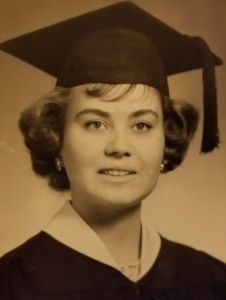 She earned a teaching credential and for 25 years – when not staying home to raise three sons – she taught at every level of school from elementary through college. We moved to San Diego from L.A. in 1969 when Dad began his career as a professor at SDSU. Mom earned her Masters Degree in Linguistics from SDSU in 1977. She was a part-time instructor of lower division Spanish at San Diego State. She was also one of the original instructors of Spanish at the newly built Cuyamaca College from 1978 to 1982, where she single-handedly developed the lab for Spanish instruction that students still use today.
She earned a teaching credential and for 25 years – when not staying home to raise three sons – she taught at every level of school from elementary through college. We moved to San Diego from L.A. in 1969 when Dad began his career as a professor at SDSU. Mom earned her Masters Degree in Linguistics from SDSU in 1977. She was a part-time instructor of lower division Spanish at San Diego State. She was also one of the original instructors of Spanish at the newly built Cuyamaca College from 1978 to 1982, where she single-handedly developed the lab for Spanish instruction that students still use today.
“We came from families with modest incomes. Education was our avenue into a more comfortable life style,” said Sera Lenihan, who along with Natalie McKelvey, were her closest friends since their days together at Manuel Arts High in Los Angeles.
While working on her Master’s degree in Linguistics, my mom wrote an article entitled "El Otoño del Patriarca y la Idea del Eterno Retorno" which was published in the Spanish literary journal En Cuadernos Hispanoamericanos.
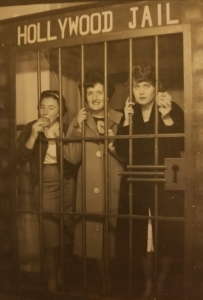 “Marion was an extremely bright, articulate woman. She was published in a prestigious literary journal - a rare accomplishment for someone without a PhD,” noted Sera.
“Marion was an extremely bright, articulate woman. She was published in a prestigious literary journal - a rare accomplishment for someone without a PhD,” noted Sera.
My folks lived in the same house in Lakeside for 45 years. We were the first people on our street – in a brand new house, in a brand new neighborhood. We moved there on my brother Richard’s sixth birthday, one week before Christmas 1972 and slightly more than a month before my brother Douglas’ first birthday.
It was a Christmas house – the ultimate Christmas present - and Mom made Christmas the best time of year with her decorations and baking. She loved Christmas and was the best cook in the world – her specialty and my favorite being “Fire Station Casserole.”
It was a different world and a different era. Mom was a professional woman and went back to teaching once her youngest son was in elementary school. But while we were little kids, she chose to stay home and raise her family. She sewed costumes for Halloween. She volunteered to chaperone for Douglas’ school field trips. She encouraged and endured Richard’s short-lived baritone playing career. She suffered through my shorter-lived attempt to learn to play the accordion. She went to every one of my little league games.
 In later years, she took up knitting, winning awards at the Del Mar Fair and making her family beautiful sweaters, blankets, knit-caps and scarves. She mastered the art form of knitting and made many good friends in the process. She and my father enjoyed walking at Lindo Lake Park in Lakeside, and she was always up for going to the movies. She loved classical music and every season went to performances of the San Diego Symphony.
In later years, she took up knitting, winning awards at the Del Mar Fair and making her family beautiful sweaters, blankets, knit-caps and scarves. She mastered the art form of knitting and made many good friends in the process. She and my father enjoyed walking at Lindo Lake Park in Lakeside, and she was always up for going to the movies. She loved classical music and every season went to performances of the San Diego Symphony.
She read the classics and loved the challenge of a long, intricate 19th Century Russian novel. But her favorite modern author was Alice McDermott. It made sense, since McDermott writes of the Irish-Catholic families and New York of the 1940s and ‘50’s my mother grew up around. It is a passage from McDermott’s Charming Billy which has special meaning for me now, as I think about my Mom, my Dad, and the marriage which gave me and my brothers our lives.
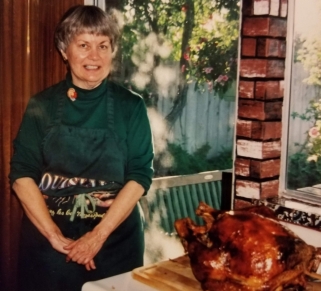 “… their love, their loyalty to one another, was no longer a matter of chance or happenstance, but a condition of their existence no more voluntary or escapable than the pace of their blood, the influx of perception... It was clear now that they would love each other until the last moment … hadn't that been the goal from the beginning? They would love each other even beyond the days they had lived together; was there any greater triumph?”
“… their love, their loyalty to one another, was no longer a matter of chance or happenstance, but a condition of their existence no more voluntary or escapable than the pace of their blood, the influx of perception... It was clear now that they would love each other until the last moment … hadn't that been the goal from the beginning? They would love each other even beyond the days they had lived together; was there any greater triumph?”
My mom suffered a massive cerebral hemorrhage while on a train heading to Los Angeles to visit my brother Douglas, his wife Giselle and her two granddaughters Ella and Sophia. She was grandmother to two boys from my brother Richard and his wife Kim – Jesse, now in Harvard and Jeffrey, freshly graduated from Stanford. She died 25 days after the death of my father and she went quickly at the age of 79 with no pain. They were married for 55 years and in the end, I guess three weeks separation was long enough.
 Her sons, grandchildren, family and friends are still in shock that she will not be around anymore. When I casually pick up the phone to call her and tell her about my week, I will have to stop and remember that now nobody will be at the other end of the line. When birthdays and holidays role around, there will no longer be an envelope in the mailbox with a card in my mom’s familiar handwriting.
Her sons, grandchildren, family and friends are still in shock that she will not be around anymore. When I casually pick up the phone to call her and tell her about my week, I will have to stop and remember that now nobody will be at the other end of the line. When birthdays and holidays role around, there will no longer be an envelope in the mailbox with a card in my mom’s familiar handwriting.
This Christmas, the lights of our house will be dim – no matter whether or not we choose to gather there and decorate it – because the woman whose spirit and energy made it a Christmas home, will no longer be there to provide its soul.
My mom has died – three weeks after my dad died. And even though death is the one inevitable conclusion every living thing faces, it still stings with the finality and sad shock of a time and era now permanently passed.
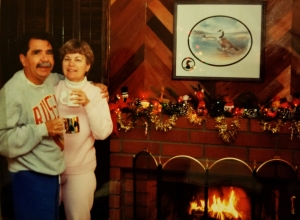 My parents are together again after a brief separation, and it is a comfort to think they will now be with each other forever. But I can still hear the tear-filled words of her friend Natalie, which describes exactly how all of us feel … “I can’t believe I’ll never see her again.”
My parents are together again after a brief separation, and it is a comfort to think they will now be with each other forever. But I can still hear the tear-filled words of her friend Natalie, which describes exactly how all of us feel … “I can’t believe I’ll never see her again.”
She was a Catholic-Irish-German-Norwegian-Swedish girl from Brooklyn who was born to poor circumstances, but through her efforts and sweetness, created a life and legacy in her sons that will never disappear. My hope – when she was riding on that train and feeling this world begin to slip away – was that she knew she’d led an important life … a life of purpose and meaning for herself, her husband, her sons, and all who knew her. A life to be remembered.
So long, Mom.







Comments
What a truly beautiful article!